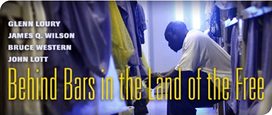Lead Essay
In this month’s lead essay, Brown University’s Glenn Loury, author of Race, Incarceration, and American Values, points out that the United States imprisons more of its population than any country on the planet. America’s incaceration policies, Loury observes, fall disproportionately on black men. Loury is disturbed that we seem rarely to consider whether these policies make sense. He argues that they do not make sense, but that “the racially disparate incidence of punishment in the United States is a morally troubling residual effect of the nation’s history of enslavement, disenfranchisement, segregation, and discrimination.” Loury contends that the American ethos of individual responsibility has largely blinded us to the fact that “society at large is implicated in [the criminal’s] choices because we have acquiesced in structural arrangements which work to our benefit and his detriment.” Loury concludes: “What the brutal facts about punishment in today’s America show is that [the] American project of civic inclusion remains incomplete.”
Response Essays
In his reply to this month’s lead essay, the University of Maryland’s John R. Lott, Jr. criticizes Loury for a selective presentation of facts about race and the American criminal justice system. Lott points out that blacks are the primary victims of crimes committed by other blacks. “If we punish black criminals a lot, isn’t it possible that the reason we are doing it is because we care about the black victims?” he asks. Lott argues that while the United States does have the world’s highest rates of incarceration, the evidence shows that the policies behind this fact have been effective in deterring crime. Additionally, Lott maintains that there is little evidence that other criminal penalties disproportionately burden blacks or the poor, and that well-intended policies meant to bring more blacks into law enforcement have actually increased crime rates in minority areas by lowering the average quality of new police recruits of all backgrounds.
James Q. Wilson sympathizes with Glenn Loury’s “impassioned cry from the heart,” yet ultimately finds that it comes up short in substance. A more programmatic approach is in order, he argues. Although imprisonment has costs, it also has benefits, including decreased risk from several types of crimes. Yet programs that attempt to reduce criminality and recidivism must start outside the penal system and address broken families, neighborhoods, and educational systems.
Harvard sociologist Bruce Western, author of Punishment and Inequality in America argues that although the growth of mass imprisonment in recent years has caused a modest reduction in crime, this reduction may not have been worth the costs. Not only did we spend billions on new prisons, we interrupted millions of lives and families. We lost the economic output of prisoners and alienated them from society at large. We further ran the risk of recidivism, because past imprisonment is strongly associated with future crime. Western characterizes the public safety provided by mass imprisonment as “short-term, expensive, and vulnerable to reversal.” Worse, there are other ways to reduce crime that do not rely on imprisonment. Today’s state legislators and governors are no longer as invested in the prison system and do not see more prisons as the solution to social ills, and this, to him, is a welcome development.

